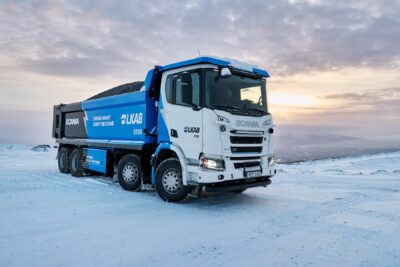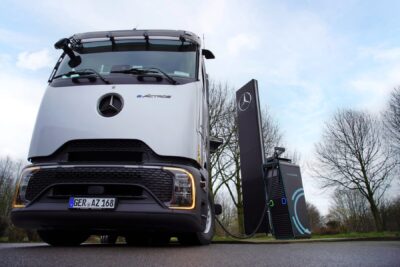MAN presents electric truck portfolio
At the pre-event in Saalfelden, Austria, MAN presented vehicles with all the drive types that the Traton (subsequently, Volkswagen) subsidiary intends to rely on in the immediate future. In addition to “optimized” diesel engines, this also includes a new hydrogen combustion engine and the battery-electric truck. MAN is remaining true to its previous line by relinquishing focus on hydrogen fuel cell electric trucks but now maintains that these are still in development.
The highlight of the battery-electric trucks at the 2024 trade fair remains the MAN eTruck, which is offered in the eTGX and eTGS variants. According to MAN, there are already over 2,000 orders or order inquiries for both variants, with a major order from France for 100 units recently added. With the eTGS, which was presented at IFAT in April, and the previously offered variants of wheelbases and equipment, the company insists that the number of configurable variants has risen to over one million.
It is precisely this diversity with its modular battery concept, numerous wheelbases, cabs, auxiliary drives and sector-specific equipment that MAN sees as making the new eTruck “fit for the needs of all relevant sectors, body solutions and transport tasks”. This is because the heavy-duty electric truck can be used for more than just regional routes, with a range of up to 800 kilometres per day possible with a charging stop. As the eTruck is also prepared for the upcoming MCS megawatt charging standard with up to 1000 kW, such a charging process can take place during the driver’s prescribed break.
“Even though the transition to CO2-free freight transport is characterised by several drive technologies, our focus is clearly on electromobility as the main drive technology,” says Alexander Vlaskamp, CEO of MAN Truck & Bus. “The hydrogen combustion engine can be a useful addition for special applications, as can the fuel cell drive, which is currently still under development.” The news about the development of hydrogen fuel cell drives will be well received by the German government which granted MAN and Shell 8 million euros for this purpose in 2020. The MAN CEO continued to reiterate the company’s continued focus on diesel engines to the end. “In addition, the diesel drive will continue to play an important role throughout the entire transformation until it is completely replaced,” assures Vlaskamp.
MAN has long since set itself the goal that by 2030, every second MAN truck registered in Europe should be battery-electric. As part of the Traton Group, MAN is working with Daimler Truck and the Volvo Group via the Milence joint venture on the appropriate truck charging infrastructure. At the same time, the course is being set internally to electrify the company’s own service network.
This electrification course is hardly ambitious. At least not from the company’s own volition. The targets set barely cover the stipulations of the EU Commission for the reduction of emissions from the sector. On 14 May this year, the Commission conclusively voted what has long been in the pipeline: that manufacturers must reduce the average emissions of trucks weighing 7.5 tonnes or more and coaches by 45% from 2030, 65% from 2035 and 90% from 2040. The CO2 emissions from 2019 will serve as a reference, and from 2035, the new regulations must also be complied with by “professional” vehicles such as refuse collection and construction vehicles. Truck trailer manufacturers must also improve the emission values of trailers by 10 per cent by 2030, while 90 per cent of new city buses must be emission-free by 2030 and 100 per cent by 2035.
In presenting the lineup, Vlaskamp explained how MAN will focus on electric trucks without at all inhibiting its production of fossil-fuelled models: “In future, we will be producing combustion engine and electric trucks on the same production line in order to be able to react flexibly to the shift in demand towards electric trucks,” says the MAN CEO. For the transition to electric trucks to succeed, however, “the expansion of the charging infrastructure must be an absolute priority for politicians, infrastructure operators and manufacturers”. The hydrogen combustion engine should only serve as a supplementary solution for special applications such as heavy-duty transport or for areas where charging infrastructure is difficult to implement – and not as an alternative to electric trucks.
While other Volkswagen subsidiaries such as Volkswagen Truck and Bus as well as Volkswagen company Navistar, the number of electric vehicle sales has increased. In the same period, MAN has suffered poor performance with declining sales. Here it might be noted that overall, of the Volkswagen truck companies, MAN is also used to enjoying higher sales than its fellow Volkswagen subsidiaries in general. To keep its position in a rapidly electrifying world, MAN may have to be even more proactive about its commitment to electrification.
Late last year the legacy truck maker revealed it is strengthening its cooperation with surrounding scientific institutions at its Nuremberg site in Germany. The company’s researchers there want to further work on “fossil-free, future-proof drives” and create synergies between science and industry.





0 Comments